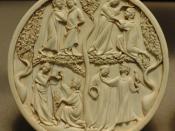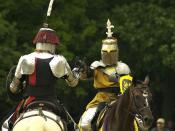Chivalry; the act of being ÃÂgentlemanlyÃÂ; has changed dramatically over the years. ÃÂIs Chivalry Dead?ÃÂ is the most frequently asked question on the topic. There are obviously going to be different views on the answer but the changing eraÃÂs need to be taken into consideration first.
Chivalry first came to be known in the medieval ages thanks to Knights. It was referred to the title of the medieval institution of knighthood and the values/ideals of; knightly virtues, honour and courtly love. It was assimilated by some as being a ÃÂwarriorÃÂs codeÃÂ, which was tweaked by the church in later years. The word itself actually comes from the French word chevalier, which means Knight in the English language. Eventually, the word came to have and aristocratic connotation: distinguishing a wealthy knight on horseback from a peasant etc. Knights in war were referred to as chivalrous if they were brave in battle, loyal to his king and God and if he was willing to sacrifice his life for the good of his defence or attack.
Towards fellow countrymen, knights were to be merciful, humble and courteous, whereas above all, to noble ladies they would be gracious and gentle; courtly love. When it came to courting women, knights had to woo a lady; it was the idea that a nobleman would dedicate his life to the love of a/his lady. Knights would write poetry, letters and songs, anything to serenade and get into the good graces of the lady of his heart and would then build up enough ego to ask his lady to dance, when appropriate. It was all rather innocent and sweet and the more ÃÂsissyÃÂ in modern thoughts, the better it was in those days.
Chivalry in the early to mid 1900s, I like to refer to as...


